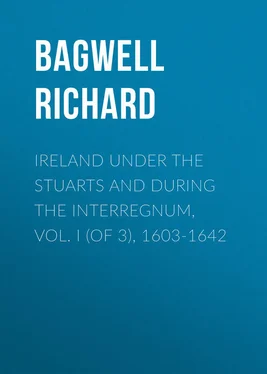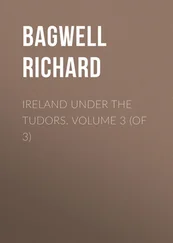Richard Bagwell - Ireland under the Stuarts and during the Interregnum, Vol. I (of 3), 1603-1642
Здесь есть возможность читать онлайн «Richard Bagwell - Ireland under the Stuarts and during the Interregnum, Vol. I (of 3), 1603-1642» — ознакомительный отрывок электронной книги совершенно бесплатно, а после прочтения отрывка купить полную версию. В некоторых случаях можно слушать аудио, скачать через торрент в формате fb2 и присутствует краткое содержание. Жанр: foreign_antique, foreign_prose, на английском языке. Описание произведения, (предисловие) а так же отзывы посетителей доступны на портале библиотеки ЛибКат.
- Название:Ireland under the Stuarts and during the Interregnum, Vol. I (of 3), 1603-1642
- Автор:
- Жанр:
- Год:неизвестен
- ISBN:нет данных
- Рейтинг книги:4 / 5. Голосов: 1
-
Избранное:Добавить в избранное
- Отзывы:
-
Ваша оценка:
- 80
- 1
- 2
- 3
- 4
- 5
Ireland under the Stuarts and during the Interregnum, Vol. I (of 3), 1603-1642: краткое содержание, описание и аннотация
Предлагаем к чтению аннотацию, описание, краткое содержание или предисловие (зависит от того, что написал сам автор книги «Ireland under the Stuarts and during the Interregnum, Vol. I (of 3), 1603-1642»). Если вы не нашли необходимую информацию о книге — напишите в комментариях, мы постараемся отыскать её.
Ireland under the Stuarts and during the Interregnum, Vol. I (of 3), 1603-1642 — читать онлайн ознакомительный отрывок
Ниже представлен текст книги, разбитый по страницам. Система сохранения места последней прочитанной страницы, позволяет с удобством читать онлайн бесплатно книгу «Ireland under the Stuarts and during the Interregnum, Vol. I (of 3), 1603-1642», без необходимости каждый раз заново искать на чём Вы остановились. Поставьте закладку, и сможете в любой момент перейти на страницу, на которой закончили чтение.
Интервал:
Закладка:
Barnewall refused to make any submission in Dublin, and in the end it was found necessary to drop all proceedings against him. His detention in London was really a triumph, for the Irish recusants regarded him as their agent, and subscribed largely for his support. Waterford contributed 32 l. and the collection was general all over Ireland. He gained in fact a complete victory, and such progress as Brouncker had made in procuring outward conformity was at once arrested. The mandates were never again resorted to. 27 27 Calendar of State Papers, Ireland , from December 1605 to September 1607.
CHAPTER III
THE FLIGHT OF THE EARLS, 1607
When Mountjoy left Ireland at the beginning of June 1603 he was accompanied by Tyrone, and by Rory O’Donnell, whose brother’s death had made him head of the clan. The party, including Fynes Moryson the historian, were nearly wrecked on the Skerries. On the journey through Wales and England Tyrone was received with many hostile demonstrations, mud and stones being often thrown at him; for there was scarcely a village which had not given some victims to the Irish war. The chiefs were entertained by Mountjoy at Wanstead, and after a few days were presented to the King, who had declared by proclamation that they were to be honourably received. Their reception was much too honourable to please men who had fought and bled in Ireland. Sir John Harrington, who had last seen Tyrone in his Ulster fastness sitting in the open air upon a fern form and eating from a fern table, gave his sorrow words in a letter to Bishop Still of Bath and Wells. ‘How I did labour after that knave’s destruction! I adventured perils by sea and land, was near starving, ate horse-flesh in Munster, and all to quell that man, who now smileth in peace at those who did hazard their lives to destroy him; and now doth Tyrone dare us old commanders with his presence and protection.’ Tyrone and O’Donnell were present at Hampton Court on July 21 when Mountjoy was made Earl of Devonshire. Before that date Tyrone was in communication with Irish Jesuits in London, and among others with the famous Archer. Devonshire’s one idea seems to have been to decide every point in his favour, and he was in a situation, so far as Ulster was concerned, not very different from that which the Earls of Kildare had formerly occupied in the Pale. He was made the King’s Lieutenant in Tyrone, and even obtained an order for 600 l. on the Irish treasury, which Carey hesitated to pay, since the result would be to withhold their due from others whose claims were not founded on rebellion, but on faithful service. When he went back to Ireland in August, the sheriffs of the English and Welsh counties through which he passed were ordered to convey him safely with troops of horse, for fear of the people. 28 28 John Byrd to Devonshire, September 8, 1603, with enclosure; Meehan’s Tyrone and Tyrconnel , p. 36; Fynes Moryson , book iii. chap. 2; Harrington’s Nugæ Antiquæ .
After his return Tyrone lived some time at Drogheda, the gentry of the Pale being unwilling to entertain him. The horrors of the late war were remembered, and the beaten rebel was generally unpopular. He had not means to stock or cultivate the twentieth part of his country, yet he took leases of more to give him a pretext for interference. He pretended that all fugitives from Tyrone should be forced to return, and Sir John Davies thought it evident that he wished exceedingly to ‘hold his greatness in his old barbarous manner.’ Otherwise there could be no object in his opposition to having a sheriff appointed for Tyrone, and yet he could hardly hope to raise another rebellion, for he was old and poor and his country extremely depopulated. 29 29 Davies to Cecil, April 10, 1604.
Donnell O’Cahan, chief of what is now Londonderry county, once known as Iraght O’Cahan, and more lately as the county of Coleraine, submitted to Sir Henry Docwra in July 1602. The lands had been in possession of the clan for centuries, but certain fines and services were due to the O’Neills. Tyrone was still in open rebellion for several months afterwards, and it was thought that the loss of O’Cahan’s district had much to say to his final discomfiture. O’Cahan, whose hereditary office it was to cast a shoe at the installation of an O’Neill, agreed to give up the land between Lough Foyle and the Faughan water to the Queen, and also land on the Bann for the support of the garrison at Coleraine. The rest of his tribal territory was to be granted to him by patent. This agreement was reduced to writing, signed by O’Cahan and Docwra and ratified under his hand by Lord Deputy Mountjoy. Pending the settlement of the question, O’Cahan was granted the custody of his country under the Great Seal. When it afterwards seemed probable that Tyrone would be received to mercy O’Cahan reminded Docwra that he had been promised exemption from his sway. At O’Cahan’s earnest request, Docwra wrote to Mountjoy, who again solemnly declared that he should be free and exempt from the greater chief’s control. No sooner had Tyrone been received to submission than he began to quarter men upon O’Cahan, who pleaded the Lord Deputy’s promise, and was strongly supported by Docwra. ‘My lord of Tyrone,’ was Mountjoy’s astonishing answer, ‘is taken in with promise to be restored, as well to all his lands, as his honour of dignity, and O’Cahan’s country is his and must be obedient to his command.’ Docwra reminded him that he had twice promised the contrary in writing, to which he could only answer that O’Cahan was a drunken fellow, and so base that he would probably rather be under Tyrone than not, and that anyhow he certainly should be under him. Tyrone’s own contention was that O’Cahan was a mere tenant at will, and without any estate in the lands which had borne his name for centuries. Docwra reported Mountjoy’s decision to O’Cahan, who ‘bade the devil take all Englishmen and as many as put their trust in them.’ Docwra thought this indignation justified, but realised that nothing could be done with a hostile Viceroy, and advised O’Cahan to make the best terms he could with Tyrone. Chichester was from the first inclined to favour O’Cahan’s claim, but the Earl managed to keep him in subjection until 1606, when the quarrel broke out again. Tyrone seized O’Cahan’s cattle by the strong hand, which Davies says was his first ‘notorious violent act’ since his submission, and the whole question soon came up for the consideration of the Government. Early in 1607 the two chiefs came to a temporary agreement by which O’Cahan agreed to pay a certain tribute, for which he pledged one-third of his territory, and in consideration of which Tyrone gave him a grant of his lands. O’Cahan was inclined to stand to this agreement, but Tyrone said it was voidable at the wish of either party. A further cause of dispute arose from O’Cahan’s proposal to repudiate Tyrone’s illegitimate daughter, with whom he had lately gone through the marriage ceremony, and to take back a previous and more lawful wife. His fear was lest he should have to give up the dowry also, and especially lest his cattle should be seized to satisfy the claim. 30 30 Docwra’s Narration , pp. 260-277; Lord Deputy and Council to the Privy Council, October 4, 1605; Davies to Salisbury, November 12, 1606; agreement between Tyrone and O’Cahan, February 17, 1606-7; Bishop Montgomery of Derry to Chichester, March 4; Chichester’s instructions to Ley and Davies, October 14, 1608, p. 60.
Интервал:
Закладка:
Похожие книги на «Ireland under the Stuarts and during the Interregnum, Vol. I (of 3), 1603-1642»
Представляем Вашему вниманию похожие книги на «Ireland under the Stuarts and during the Interregnum, Vol. I (of 3), 1603-1642» списком для выбора. Мы отобрали схожую по названию и смыслу литературу в надежде предоставить читателям больше вариантов отыскать новые, интересные, ещё непрочитанные произведения.
Обсуждение, отзывы о книге «Ireland under the Stuarts and during the Interregnum, Vol. I (of 3), 1603-1642» и просто собственные мнения читателей. Оставьте ваши комментарии, напишите, что Вы думаете о произведении, его смысле или главных героях. Укажите что конкретно понравилось, а что нет, и почему Вы так считаете.












